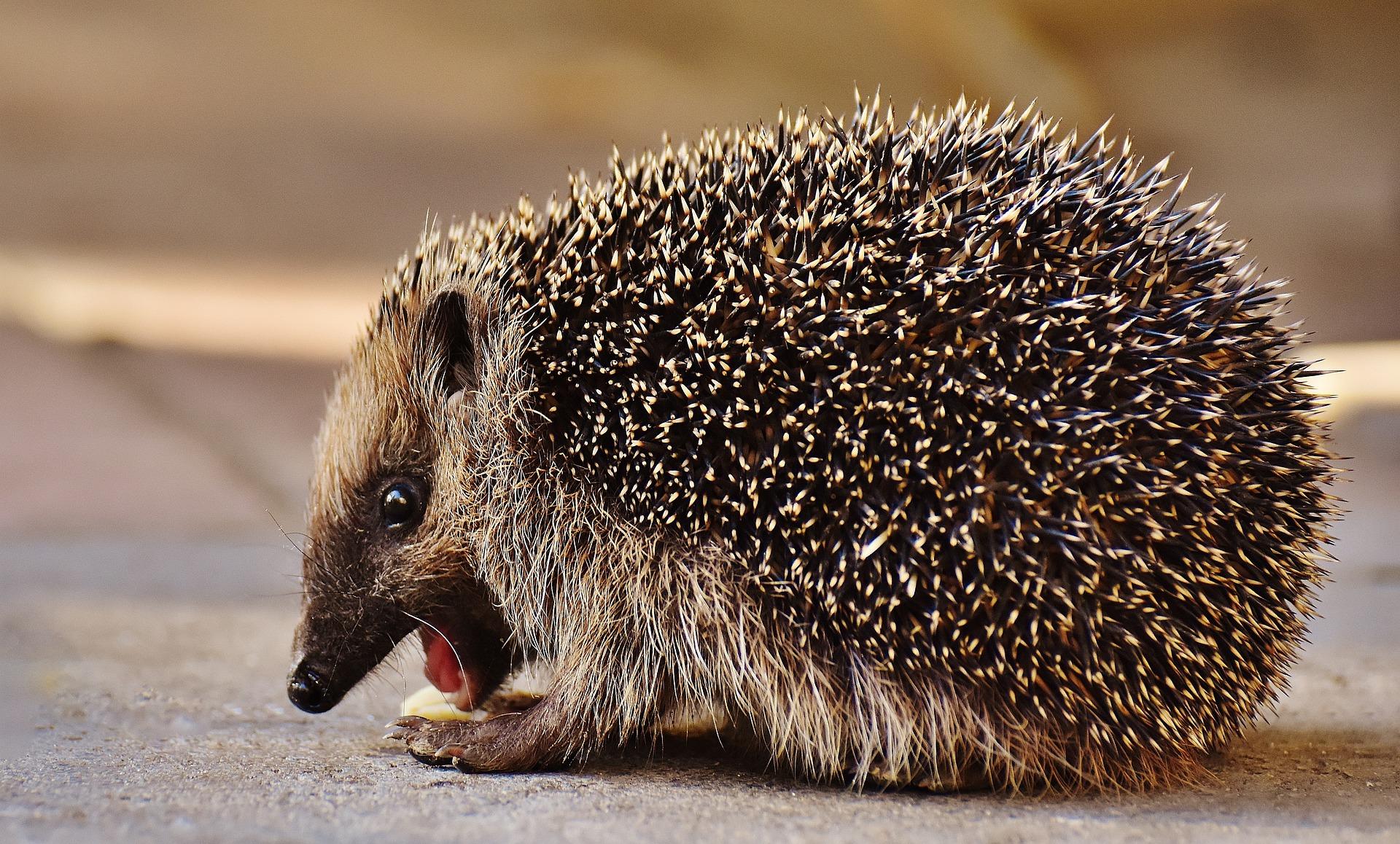Why Do Hedgehogs Bite? - Reasons and Prevention


The hedgehog has gained much popularity as a pet, owed in part to their undoubtedly cute features. They are also relatively small, making them suitable for those who live in apartments. However, this doesn't mean they don't require an appropriate level of care. As with any companion animal, adopting a hedgehog into your family is a responsibility you can't take lightly.
It can happen that hedgehogs will bite or snap at you. Although we are only trying to show them some love, we often ask ourselves why do hedgehogs bite? AnimalWised reveals the reasons behind your hedgehog's biting behavior and what we might be able to do about it.
Reasons your hedgehog bites you
The first thing we should know about biting in hedgehogs is that it is not a common behavior. Famously, a hedgehog uses their spines for protection, rolling up into a ball in a defensive position. A hedgehog is unlikely to go on the offensive and bite you, even if you get too close to them. When a hedgehog does decide to bite you, no matter how aggressively, it is a sign of an underlying issue.
The most common reasons why hedgehogs bite are:
Illness
The physical discomfort and/or pain of an illness can make a hedgehog bite. When we try and pet or hold them, the hedgehog may know that you are not being aggressive. However, the discomfort of being touched when sensitive is something they will want to avoid. Biting in this case is a warning to tell us they want to be left alone. This reason for biting will usually see the hedgehog return to their cage to rest peacefully.
If we suspect our hedgehog is biting because they are sick, we should look for other symptoms. In general, their outer appearance will give us an idea of their well-being. If they look less vibrant, their fur is in poor condition or their quills start falling out, it is possible they have a health problem. Behavioral changes can also imply disease. If they scratch a lot, lose balance or stop eating, it is likely they are unwell.
They are quilling
We should not necessarily assume shedding quills on its own is a symptom of disease. Domestic cats will shed their hair a couple of times a year. When they are younger, hedgehogs will shed their spines. As new larger quills grow, the smaller spines shed.
Quilling is term we use for hedgehogs shedding their spines. Between the ages of 7 to 12 weeks, quilling is at its most acute. It will happen again, but it will lessen as they age. Adults do not quill much at all. However, younger hedgehogs may feel sensitive when their quills fall and bite out of unease or frustration.

Stress
Hedgehogs are sensitive mammals and can suffer stress easily. Different stimuli in their environment can cause the hedgehog to manifest stress. When they feel stress they will try to hide and remove themselves from any such stimulus. If we try to catch them and pick them up, even in an attempt to reassure them, they may bite us and try to run away.
When your hedgehog is suffering from stress, it is important we find out the cause and eliminate. Common causes of stress in hedgehogs include:
- Other pets
- Loud noises
- Over-handling
- Poor hygiene
- Disease
- Stress
It is important to remember that hedgehogs are nocturnal. For many hedgehog guardians, this can seem inconvenient. We may want to play and interact with them during the daytime, but doing so can be stressful for the hedgehog. We need to respect their behaviors and boundaries.
Exploration
Although small, hedgehogs are curious animals. In the wild, they enjoy exploring their natural habitats. Hedgehogs have relatively poor eyesight, in part due to their nocturnal activities. This means they have other means of exploration. Nibbling and biting allows them to look for resources, weigh objects and generally sense things which they cannot through vision alone.
When we put our hand in a hedgehog cage, it is possible they bite us because they are investigating us. However, it is important to note that this kind of biting is unlikely to be painful. More likely, they will nibble on us out of curiosity.
Behavioral problems or poor education
As with other animals we want to keep domestically, the hedgehog requires training. They need this not so that they can do tricks, but so they can best adapt to living with species other than their own.
By nature, hedgehogs are solitary animals. They can find it difficult to spend time with other members of the same species. They can become competitive and/or defensive. For this reason, they are not suitable for constant company. They will need their own space and spend much of the daytime sleeping.
It is possible you have unconsciously ‘taught’ your hedgehog to bite you. If you try to manipulate them too much, it is possible they will bite you to leave you alone. Removing your hand when bitten means the hedgehog learns that biting you has the consequence of being left alone. In these cases, we have unwittingly reinforced negative biting behavior.
How to react when your hedgehog bites you
Now you know the main reasons why a hedgehog bites you, we need to find strategies to stop this negative behavior. The moment when the actual bite happens is crucial. If we behave incorrectly, the result may be reinforcing negative behavior. When your hedgehog bites you, we recommend:
- Never hurt the hedgehog: when you are bitten hard, we might instinctively try to push them away or even lash out at them. Trying to hurt them to release the bite will not only cause the animal pain, it can make them tighten their grip even more.
- Never scream: yelling and screaming at the hedgehog will make them interpret the situation negatively. This means they associate you with negative feelings and will have difficult bonding. It can be difficult to stop a cry of pain, but the more collected we are, the better.
- Don't drop them: similarly, it might seem like it would be difficult to control our reaction, but it's important to remember that a hedgehog will not be able to inflict much serious damage (unless they bite through a vein or pass on bacteria). Dropping them when they bite you can be very dangerous to their mental and physical well-being.
- Blow to release them: instead of violent action, gentle blowing on the hedgehog's face is an effective way for them to release their bite. If this doesn't work, try distracting them with a toy or treat.
- Give them space: don't return to their cage once they bite you and try to force interaction. It will build up bad feeling in the hedgehog. in the future, when you come near them, they will see you as someone who won't listen and will use their only recourse available; to bite you.
- Never punish them: ignoring the hedgehog, restricting food or any other kind of reprimand will not work as a deterrent to biting. The reason is because they will not be able to associate these actions with the initial biting behavior. All you will do is cause further stress and build resentment. In some cases, you will damage the hedgehog's health.

How to prevent a hedgehog from biting you
The best method of prevention in terms of hedgehog biting is to do with training. By educating and socializing them properly, we can form a bond of mutual respect. For this, we recommend:
- Establish a bond: being such a small animal, it is understandable the hedgehog will be intimidated by us. They spend many hours in their cafe due to security reasons, so we need to establish ourselves as a person of trust. Establishing a bond will require us to approach them carefully, be gentle in our actions, use reassuring language and avoid sudden movements.
- Provide necessities: a hungry or thirsty hedgehog is more likely to bite you. They will feel abused and may be in a desperate situation. By being the provider of their resources, especially food and water, it should help them to see us as a positive presence and be less likely to bite.
- Control their environment: a noisy or overly bright environment will encourage feelings of stress in the hedgehog. This can cause them to bite. While hedgehogs can get on with other pets if they are well-socialized, they may also be scared of them. Ensure they have only natural light and a place to hide when they need to feel safe.
- Respect their schedules: to best avoid biting and ensure a general harmonious relationship, don't pester them during the day. Respect their need to sleep and don't simply pick them up when you want to.
- Avoid strong odors: if you use strong lotions, perfumes or any other scented beauty product, you should consider changing them. Hedgehogs have a good sense of smell and certain scents can bother them and lead to biting behavior.
If you follow these guidelines, you can best help prevent a hedgehog biting you in the first place. Whatever type of hedgehog you have, remember to give them time and space. For general bonding, respect their boundaries and let them come to you so they can feel safe. Once a strong bond has been established, it is likely they won't bite you any more.

If you want to read similar articles to Why Do Hedgehogs Bite? - Reasons and Prevention, we recommend you visit our Behavioral problems category.







